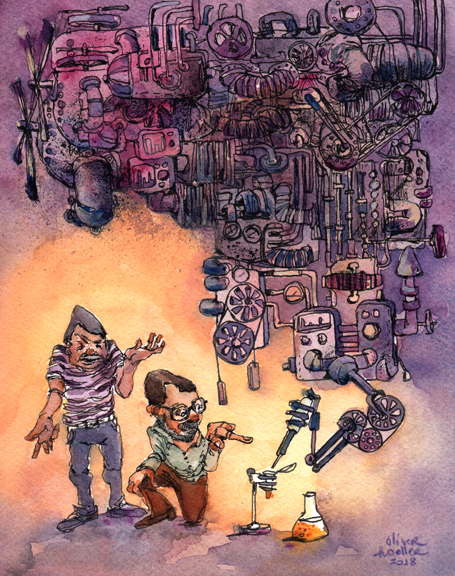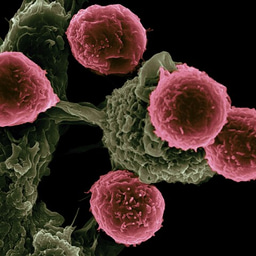

Unthinking reliance on commercial research aids and reagents can cause a debilitating erosion in basic knowledge.
In these days of connectivity, online identity, and oversharing, it’s sometimes hard to remember that there was a time when it was difficult to know exactly where you were at any one moment, and how to get from point A to B.
Back then, the arrival of TomToms and other personal driver aids really did feel like the future coming ahead of time. At a stroke, they banished the horror of long car trips spent wrestling with a road atlas the size of a child’s tent, the queasy and doubting need to deputise passengers of questionable competence as navigators, the panicky and confused checks for service stations and public toilets. We’ll never know for sure how many marriages were jeopardised by arguments over when is the right time to say “Turn now!”, but it’s a fair bet the number was a high one.
TomToms and other navigation aids abolished all that at a stroke. Suddenly, and since then, anybody could get anywhere – on the roads, on public transport, on foot – efficiently and without too much trouble. Nowadays, we’re so used to seeing ourselves as a flashing dot on a map that it’s a wonder the first “Alien” film, with its classic scene depicting two dots converging on one another in a tunnel, still has the capacity to terrify.
As is so often the case with new technology, while these inventions have undoubtedly made things much easier and faster, the problem is what happens when they stop working, or if they are not quite used correctly. The likelihood now is that most drivers are so dependent on their personal navigation apps and devices that without them many would struggle to complete their journeys. They don’t know the roads, they don’t have a mental map of the road network, they’re not confident plotting a course with an atlas.
A mixed blessing, in other words, despite their obvious and huge advantages. Navigation aids have sped things up and undoubtedly made getting around easier – but it’s come at a cost of an erosion in basic navigational skills.
That punchline is one that should be noted by all research scientists, not least younger disciplines like molecular biology. Right now we’re probably training the 5th or 6th generation (that’s scientific generation, not human generation) of molecular biologists, and it’s remarkable how things have changed since the field’s inception in the late 50s and early 60s. Current junior faculty members may just about remember having to cast their own sequencing gels (look out for the air bubbles!), but even they probably already belong to the “kit generation” who had Qiagen and other suppliers on tap for their basic needs.
What can the current crop expect? Gene sequencing has long been an outsourced service, but expect gene synthesis to become routine, custom knockouts/endogenous replacements at both cell and organism level on demand, and much more. Frontline analytical techniques such as mass spectrometry, imaging, bioinformatics, phenotyping, and others have already become the specialised preserve of core facilities rather than individual research groups.
As with TomToms, such innovations have unquestionably resulted in massive gains in terms of speed. In the early days of DNA sequencing you could publish the nucleotide sequence of a bacterial plasmid as a PhD thesis; now human whole-genome sequencing is fast approaching usage as a basic medical diagnostic tool. Until recently, cloning constructs and assembling reagents (cell lines, antibodies) still accounted for a very large percentage of the total time allocation in a research project; now with Gibson assembly, the Addgene repository, and a dizzying list of support companies in reserve, young scientists are able to spend more and more of their time actually doing assays to answer research questions and test hypotheses instead of just setting up.
The problem is that this enhanced speed can too easily go hand-in-hand with an erosion in basic biochemical knowledge, especially core concepts in protein/nucleic acid biochemistry, metabolism, and enzymology. It’s partly facilitated by proprietary behaviour on the part of companies, with kits increasingly resembling magic boxes with solutions A/B/C and no clues as to their composition. It’s also the flipside to what is otherwise an entirely positive development, namely the influx of people from different fields – physics, computer science, engineering – who can increase interdisciplinary research and catalyse methodological change and enhancement, but who also may be deficient in their familiarity with fundamental concepts in biology.
Using kits without understanding the composition of the solutions (test: can you explain the principle of alkaline lysis that underpins just about every commercial miniprep kit?) is just the visible tip of the iceberg. Other lurking perils are the use of commercial antibodies without personal evaluation and controls, the use of cell lines that have not been recently validated for genotype (without which, your beloved human neuroblastoma cell line may well be contaminated with HeLa cells), and the incautious use of software algorithms (see here for a comment on a 5-paper retraction that occurred due to this in 2007). And they’re all symptomatic of a bigger concern, namely a constitutional weakening in the grasp of biochemical knowledge by the next generation of scientists.
A vivid depiction of the perils implicit in this slow drift towards a loss of basic knowledge can be found in the world of tabletop wargames. In the Games Workshop-produced dystopian science fiction blaster “Warhammer 40,000” (tagline: “in the grim darkness of the 41st millennium, there is only war”), humanity is depicted as an advanced civilization where engineering has literally reached the level of a religion. With absolutely no knowledge of how their advanced warmachines work, engineers have become technician-priests who tend to their mechanical charges by blindly following protocols – now performed as rituals – written generations earlier.
When knowledge is lost, technology becomes no different from magic. When protocols are followed without understanding or question, progress stagnates. It’s become a mantra of 21st century technological progress that our advancements will free up more time and more brain space for thinking and complex tasks – but the proliferation of cat videos, forwarded memes, and the howling inanity of so much online content give the lie to that notion. Rather than advancing ourselves, there’s a risk of turning into a culture of lotus-eaters.
A key feature of the Scientific Revolution of the 17th century was its refusal to continue accepting Aristotelian philosophy at face value, and to begin questioning the dogma of previous generations. All scientists are children of its legacy. Not knowing how things work easily leads to unquestioning acceptance, and unquestioning acceptance is anathema to scientific practice. When you’re driving a research project, make sure you’re not asleep at the wheel.





Join the FEBS Network today
Joining the FEBS Network’s molecular life sciences community enables you to access special content on the site, present your profile, 'follow' contributors, 'comment' on and 'like' content, post your own content, and set up a tailored email digest for updates.